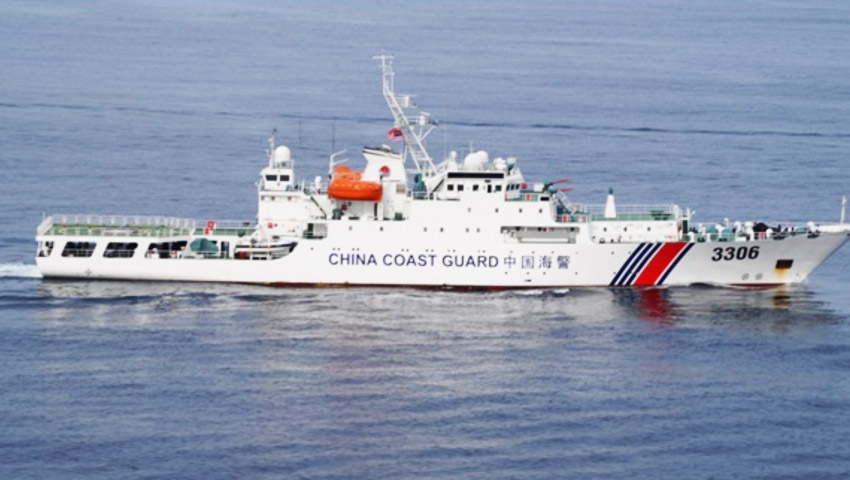Risks associated with new powers that authorise the China Coast Guard to use force in contested waters have been understated, according to a senior ASPI analyst.
Michael Shoebridge, director of the defence, strategy and national security program at the Australian Strategic Policy Institute (ASPI), warns that Beijing’s new law authorising the China Coast Guard to use force against foreign ships in disputed territories claimed by China have “attracted far less attention than it deserves”.
This “boldness”, Shoebridge writes, is evidence that President Xi Jinping’s “ratcheting up the risk” he’s willing to take to project Chinese power.
The ASPI analyst dismisses the Chinese state media’s claim that the law resembles those implemented by other nations, noting that it suggests Beijing will ignore international law of the sea and international tribunal rulings.
Shoebridge adds that the law defines the coastguard’s jurisdiction to use force through China’s own interpretation of its maritime boundaries.
He also warns that, in practice, the Chinese coastguard is likely to operate more aggressively than its regional neighbours.
“We’ve got used to stories of Chinese fishing fleets and Chinese militia vessels intimidating other nations’ vessels and even bumping into them to get their way, particularly in the South China Sea in waters claimed by Vietnam and the Philippines, but also down into the Natuna Islands in Indonesia’s exclusive economic zone,” he writes.
“Chinese vessels have sunk Philippine and Vietnamese fishing vessels in the last year, and not seemed too bothered about meeting obligations to provide assistance to sailors needing help afterwards.
“We’ve also got used to the Chinese coastguard shadowing Chinese fishing fleets, ready to intervene if they come into contact with other nations’ vessels.”
Shoebridge claims that in introducing the new law, President Xi has licensed his coastguard to be “wolf warriors” at sea with the authority to use force, including lethal force, to assert Chinese interests.
“The Chinese coastguard has been building some novel ships that let it apply force not just with the weapons on board, but with the ships themselves,” he continues.
“Coastguard vessels like the 10,000-ton Haixun aren’t just bigger than many naval ships operating in the South and East China Seas, but they also have strengthened hulls that are designed for deliberately hitting other vessels — ‘shouldering’ is the naval term of art.
“Imagine a specially designed large vessel like the Haixun ‘shouldering’ a Vietnamese, Philippine, Indonesian or even US naval vessel, enabled by Xi’s law and his command to Chinese agencies and officials to engage in a difficult ‘struggle’ against the world.”
Shoebridge notes that ships operated by rival navies, including the Royal Australian Navy, don’t have strengthened hulls but are instead designed to withstand some damage, and are primarily tasked with preventing missile attacks.
“[We] may need to be thinking less about the Chinese coastguard firing on other nations’ vessels and more about how to handle coastguard commanders who are full to the brim with wolf warrior spirit and licensed by Xi to get into trouble, and how to deal with ships designed to hurt others without using their weapons,” Shoebridge writes.
“The ability to inflict damage without weapons gives the Chinese coastguard the easy ground in an encounter. A naval vessel that can’t bump back without damaging itself is left with the choice of backing off and handing the encounter to the Chinese or using its weapons and being the first to fire.
“Neither is a great place to be.”
The ASPI analyst warns that Chinese attempts to ‘shoulder’, damage, and perhaps sink other nations’ fishing or naval vessels would be a “hugely escalatory and aggressive” move.
Shoebridge calls on world leaders to ramp up efforts to dissuade Beijing from employing bully tactics at sea.
“Maybe Xi needs to hear this from the leaders of other countries before we start seeing such antics on the water,” he argues.
“More crystal-clear Biden phone calls to Xi, and maybe calls from leaders like German Chancellor Angela Merkel, who could mention it while celebrating investment agreements, are paths here.”
He adds: “In his first conversation with Biden, Xi said the US needed to show caution — well, that’s a message he might take up himself.”
Get involved with the discussion and let us know your thoughts on Australia's future role and position in the Indo-Pacific region and what you would like to see from Australia's political leaders in terms of partisan and bipartisan agenda setting in the comments section below, or get in touch with









